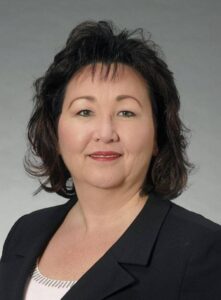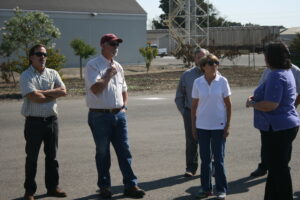Growing Together Fall 2023
Western Plant Health and Grow West Team up to Push for Smart Ag Regulation
Healthy Plants. Healthy People. Healthy Planet. Those six words serve as the mission statement for Western Plant Health (WPH). It’s a brief, concise and to-the-point statement that intentionally highlights what’s become the calling card for the organization representing 90% of the fertilizer and crop protection companies in California, Arizona and Hawaii that Renee Pinel leads.
“We have to be clear that we are about sustainability, stewardship, production and economic stability,” said Pinel, who’s served as WPH’s president and CEO since 2006 after 15 years as its legislative and public policy director. “We need to speak outside of what our members are comfortable with. We’ve converted our message to something the public and lawmakers in Sacramento understand. We’re all about what keeps our people, planet and plants healthy.”

Grow West contributes to that effort as a WPH member. Vice President and COO Lucas Schmidt also currently sits on the WPH board of directors. Effective communication through its partnership with WPH enables Grow West to both provide input into practical regulation for agriculture but also bolster the communities in which it works. Success in contributing to practical ag regulation provides assurance that Grow West will be able to continue to support its communities and evolve its service offerings for its grower customers with continuity and without regulatory disruption.
“This kind of collaboration makes us all better. For me, it ties back to our communities when we talk about things like how ag regulation affects how we operate and how our work supports our communities,” Schmidt said. “Our partnership with WPH is just one way we work with experts and leaders in our field for everyone’s benefit.”
What Western Plant Health is all about
The idea that the trade association representing the vast majority of the region’s fertilizer and crop protection companies is committed to environmental stewardship is an odd notion to many outside of agriculture, Pinel admits. Though productive dialog with lawmakers often starts from a defensive position for WPH, they’re critically important conversations to have, now more than ever. Especially coming from the organization whose mission includes promoting a healthy business environment, consumer education, environmental stewardship, agronomic best practices, and meaningful public policy on agriculture and the environment.
“The automatic assumption is that if it’s a pesticide, you’re harming people or damaging the environment. And with fertilizer, people don’t often understand that it makes plants grow and isn’t harming the water supply and environment in general,” Pinel said. “While they’re not always easy conversations, we have the opportunity to focus on connecting with people whose legislative actions could otherwise make life difficult for farmers.”
Those regulatory conversations don’t end with state legislators. Environmental groups often pit agriculture against the very ideals that are fundamental to WPH’s mission of preserving the environment and growing ag productivity. But Pinel sees WPH’s influence as most important in showing those two goals aren’t necessarily far from one another.
“Environmental groups are playing four-dimensional chess with multiple messages. So we have to do the same and always think ahead. If the public wants softer chemicals, then the state must have practical mechanisms in place in the regulation process that enable our members to research, produce and provide those chemicals,” she said. “We want to make sure regulation provides a pathway for the state and our members to access sustainable products. That requires a big-picture, sophisticated mindset.”
Putting strategy into action for California agriculture
Tactically, that mindset means sometimes applying arguments that agriculture’s opponents or misinformed influencers use against WPH, its members and the ag producers they serve. That process often yields just as much or more common ground than it does opposition.

“Rather than us all talking at and past each other, we explain what our opponents need to do to achieve what needs to happen to reach practical goals for agriculture and the environment. Sometimes that means using their arguments against them,” Pinel said. “We’re never going to change 43 million Californians’ minds, but with the right messaging, we can reflect what they want and they can see that Western Plant Health and our members are trying to help create a healthier world for all of us, not just trying to sell pesticides and fertilizers.”
That’s not always easy. The common ground at the feet of the traditional battle lines between agricultural and environmental interests is often difficult to uncover. She recognizes growers have jobs to do. So she wears the mantle of accountability in leading that dialog.
“I do make a point of going to public hearings that are filled with environmental justice and anti-pesticide groups screaming at me. But I make a point of being there because I don’t expect the farmer to stand up in that and feel like he or she is being personally targeted,” Pinel said. “Recognizing other people’s messages is part of our message. We’ll continue working to help policymakers think objectively moving forward.”
Opportunities like these have real impact at the retail and farm levels. Schmidt said he’s able to integrate messaging tactics to key ag stakeholder groups that are normally used by industry opponents. Doing so helps him create a level playing field on which he can practically answer questions that are sometimes based on assumptions or misinformation.
“How are those with opposing viewpoints and goals being successful? What messages are they sharing with farm workers, for example?” he said. “Learning these things helps us find the right channels and information to share that will help us all get better as an ag community.”
Why Grow West is so important to WPH’s work
As a WPH member, Grow West and its customers benefit from the influence the organization has on state policy. Schmidt’s team also contributes to the WPH mission in leading by example.
“They have the technical knowledge that helps us maintain the continuous drumbeat of where we need to be as an industry,” Pinel said. “They have their own stewardship program that assures everyone that they’re going to continue to prioritize the environment in everything they do. And they’re never afraid of anybody walking onto one of their facilities to see that priority in action. They’re one of the leaders in adopting the kind of progressive mindset we need to advance western agriculture.”
“We’re always happy to collaborate with WPH’s leadership to make sure we provide the appropriate experience on the retail or production ag side, whether it’s a group of lawmakers from Sacramento or Washington, D.C.,” Schmidt added.
